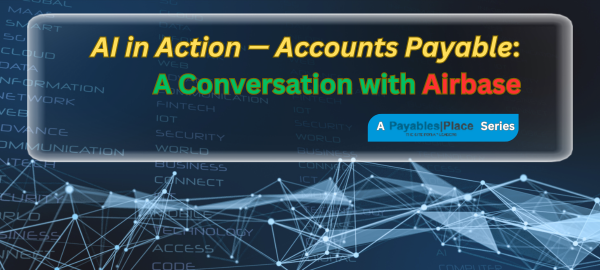A New AI Series on Payables Place
The power of artificial intelligence (AI) is undeniable. Its impact and influence are revolutionizing the Accounts Payable (AP) and Business-to-Business (B2B) payments automation market. According to research from Ardent Partners, AI will soon be ubiquitous in this sector, offering unparalleled efficiencies and capabilities. The transformative possibilities of AI will drive innovations in invoice processing, payment automation, fraud detection, and overall financial management, streamlining enterprise operations and improving business decision-making.
In view of these advancements, Ardent Partners is launching a special “AI in Action” interview series. Our “AI in Action” series represents an opportunity for our Chief Research Officer, Andrew Bartolini to sit down with senior executives at the ePayables solution providers that are focused on AI now and in the near-term and use these discussions as an opportunity to share their company’s focus on, expertise in, and vision for AI within the AP industry.
Today’s AI in Action profile features a conversation with Thejo Kote, founder and CEO of Airbase.
AB: Good day Thejo, tell our readers a little bit about yourself.
TK: My name is Thejo Kote, and I am the Founder and CEO of Airbase, a leading procure-to-pay platform that simplifies and automates non-payroll spend management for mid-market and early-enterprise companies.

Founder and CEO
Airbase
I founded Airbase to solve the problem of inefficient operations around company spending that I personally experienced in my first company. At the time, card rails were just opening, and I realized an opportunity to build a solution on top of them. My small team and I created one of the first software-enabled corporate cards. In the seven years since that time, we’ve broadened our platform to include all types of payments on different payment rails in multiple currencies. All with our signature approval and accounting workflows wrapped into the spending process.
We have long taken advantage of machine learning (ML) and AI in building out products to read, interpret, and categorize invoices. We’ve extended its use to our spend analytics capabilities for predictive modeling of spend. Our platform now supports companies in managing their procurement, AP automation, expense management, and corporate cards, with the added power of AI-driven workflows and insights. Over the years, we’ve seen firsthand how automation, particularly AI, can transform how companies approach their finances and operations.
AB: Thank you. I think I know your answer but let me ask anyway … what are the biggest opportunities for AI to improve AP and B2B payment efficiencies and productivity?
TK: The most significant opportunity for AI to improve AP and B2B payments lies in automating invoice processing and expense management. Invoices have traditionally required manual data entry and reconciliation, but with AI — specifically ML and optical character recognition (OCR) — we’ve created systems that can automatically extract, interpret, and categorize invoice data with high accuracy. This results in significant time savings for AP teams and eliminates costly human errors.
For example, at Airbase, we’ve introduced a touchless expense report creation experience. Using generative AI, our system automatically extracts details from receipts and even generates the memo field, reducing the burden on employees to manually submit reports. This process has led to a 30%-40% reduction in time spent on expense management for several of our clients, enabling their finance teams to focus on more strategic activities.
Another key area is fraud detection. AI-powered systems can analyze transaction patterns in real time to detect anomalies and flag potentially fraudulent activities. For instance, one of our clients was able to reduce unauthorized spend by 15% within the first year of implementing AI-driven spend management at Airbase.
Additionally, predictive analytics offers opportunities to forecast payment schedules, helping companies optimize cash flow and working capital management. AI can analyze historical spend patterns and predict future payment trends, ensuring businesses are better equipped to manage liquidity and payment commitments.
AB: How do you view your customers’ (and prospective customers’) AI attitudes?
TK: Our customers are increasingly enthusiastic about AI, especially as they see its practical applications in automating routine tasks and providing actionable insights. For many mid-market companies, AI offers a way to scale operations without hiring additional headcount, which is crucial for teams that are already stretched thin.
One customer, Definitive Healthcare, implemented Airbase’s AI-driven spend analytics and reported that the system provided them with real-time visibility into all their spending, which helped them make more strategic procurement decisions. This shift to data-driven decision-making has resulted in a 10% improvement in vendor management efficiency and faster close cycles.
However, there’s still some caution among customers regarding the reliability of AI. Many companies want to ensure that AI systems won’t compromise data integrity or lead to compliance issues. That’s why at Airbase, we place a strong emphasis on transparency and user control, allowing customers to oversee and audit AI-driven processes at every step. Our clients are confident in AI when they know they can see how decisions are made and intervene when necessary.
AB: What are the leading AI subsets (e.g., machine learning, natural language processing, deep learning, etc.) with the biggest impact on accounts payable/B2B payment solutions? And why?
TK: The two most impactful AI subsets for AP and B2B payments are machine learning and natural language processing (NLP). At Airbase, we leverage ML to automate invoice data extraction, matching invoices to purchase orders or contracts, and predicting payment cycles based on historical trends. This drastically reduces the need for manual intervention in invoice processing, saving both time and labor costs.
NLP is particularly valuable in expense management. Airbase uses NLP to read and interpret unstructured data from receipts, emails, and documents, allowing the system to fill out expense reports automatically. This touchless process not only improves efficiency but also increases accuracy, as it reduces the human error often associated with manual entry.
In addition to these, generative AI has started to make a meaningful impact by allowing us to offer advanced features like auto-filling expense report fields, making the entire process seamless for users. For example, employees no longer need to manually submit reports — our system does it for them based on receipts and past transactions, further increasing efficiency and reducing friction.
AB: How are you ensuring the accuracy and reliability of customers’ AI models (AI data output)?
TK: Accuracy and reliability are paramount when deploying AI models, especially in sensitive areas like AP and B2B payments. At Airbase, we ensure high levels of accuracy through continuous model training and robust validation processes. Our AI systems are regularly updated with new data from a wide range of client transactions, ensuring they remain accurate and responsive to evolving business needs.
We also incorporate feedback loops where users can correct any inaccuracies. The AI learns from these corrections, improving its precision over time. Furthermore, we maintain a clear audit trail for every AI-driven action, so customers can track and review all data outputs, ensuring transparency and reliability. This combination of automated learning and user control ensures that our AI-driven solutions are both accurate and trustworthy.
For instance, one of our clients saw a 25% reduction in invoice processing errors after implementing Airbase’s AI-powered automation, which speaks to the reliability and continual improvement of our models.
AB: How do you plan to support your AP clients if/when an AI skills gap exists?
TK: We recognize that some companies may face an AI skills gap, which is why Airbase is designed to be intuitive and accessible to users of all technical backgrounds. Our platform provides no-code automation tools that allow finance and procurement teams to set up and modify workflows without needing any coding knowledge.
Additionally, we offer extensive training during onboarding and provide continuous support through our customer success team, many of whom are certified CPAs and financial experts. This ensures that our clients have the help they need to fully leverage AI, even if they lack in-house expertise.
Moreover, our AI features are baked into everyday workflows — meaning users don’t need to interact with the AI directly to benefit from it. This “behind-the-scenes” AI is part of our strategy to simplify adoption and usage across the board. As a result, we’ve seen over 90% user adoption rates for our AI-driven spend management features across multiple clients.
AB: Where do you see AI going within the ePayables (AP automation) market over the next five years?
TK: In the next five years, AI will continue to transform the ePayables and AP automation landscape, with autonomous decision-making becoming a core feature. I believe we’ll see AI systems not only automating processes but also making strategic decisions — such as approving low-risk transactions or recommending optimal payment schedules based on cash flow projections.
Predictive analytics will become more sophisticated, allowing finance teams to anticipate spend patterns, vendor performance, and potential bottlenecks before they occur. AI will also become more deeply integrated with other business functions, providing holistic insights that drive broader business decisions.
At Airbase, we are already exploring the use of generative AI to further enhance spend management, such as offering advanced vendor management tools that predict supplier performance and provide insights on negotiation strategies. As companies continue to prioritize efficiency and cost savings, AI will become an indispensable part of their finance operations, offering smarter and more scalable solutions for managing spend.
AB: I want to take this opportunity to congratulate you and Airbase on being a finalist for our 2024 AP Honors Procure-to-Pay (P2P) Collaboration Award! What was the vision for bringing greater P2P collaboration to the business?
TK: One of the biggest spend management issues for enterprises is the disjointed tools traditionally used for corporate spending, with each tied to specific payment methods like credit cards, ACH, or checks. In large enterprises, expensive legacy tools address some of these challenges but are cumbersome to implement and maintain. Conversely, smaller companies rely on fragmented, single-use-case solutions that lack the sophistication and scalability needed as they grow. Mid-market companies were left underserved, caught between these extremes.
Our goal is to improve the lives of people in the CFO’s office by enabling them to deploy capital smarter and run their businesses more effectively. And that’s how we operate internally as well.
AB: Talk about the importance of empathy and collaboration within the business, and the shift to viewing spending as a lifecycle rather than a linear process.
TK: A successful P2P strategy hinges on empathy and collaboration among departments. Airbase promotes a mindset shift from viewing spending as a linear process to seeing it as a lifecycle. This cyclical approach fosters repeatable and scalable processes, leading to long-term efficiency gains.
Airbase’s philosophy mirrors modern approaches to customer relationships: building a ‘flywheel’ where spending processes drive efficiency, insights, and collaboration in a virtuous cycle. By aligning departments and fostering a cohesive environment, it creates empowerment to maximize the value of every dollar spent.
AB: Congratulations again on being an AP Honors award finalist. I appreciate your time today!
TK: Thank you.

